|
||
| Recordings to celebrate the world of the oboe | ||
|
AND PIANO CC2022 CD DETAILS (click what you want to see)
|
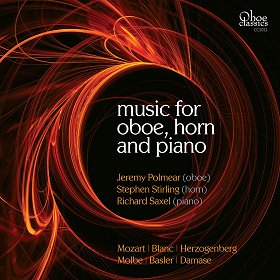
|
Trio with bassoon:
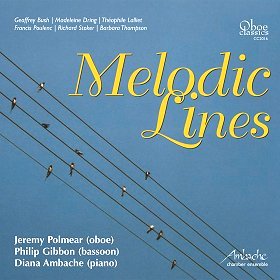 Oboe Trios:
Oboe Trios:
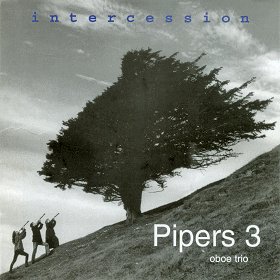 A mixture of music:
A mixture of music:
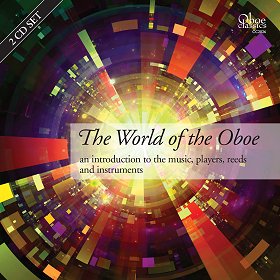
|
(click underlined movements to hear MP3 format sound clips)
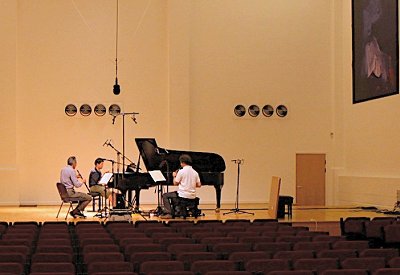
W A Mozart (1756-91): Trio after the Quartet K407
Allegro - Andante - Rondo: allegro
Adolphe Blanc (1828-85): Romance Op 43b
Heinrich von Herzogenberg (1843-1900): Trio Op 61
Allegretto - Presto - Andante con moto - Allegro
H Molbe (1835-1915): Air arabe
Paul Basler (b1963): Vocalise-Waltz
Jean-Michel Damase (b1928): Trio (1990)
Allegro deciso - Andante - Presto scherzando - Molto moderato - Allegro
Total Time 68:49
The 20-page full colour CD booklet has a 3,000 word programme note in English with full details of each track.
There are biographies of the players, web links and many photographs.
Introduction by Jeremy Polmear:
 In the realm of chamber music the combination of oboe, horn and piano is an unusual one.
The string quartet medium reigns supreme in its ability to inspire great works from great
composers. There are many reasons for this, one being that in a string quartet each
instrument has its own character, but all are of the same family so that they can also
blend as a unit. Each can add its voice on equal terms to the others, speaking the same
language but with its own individual accent.
In the realm of chamber music the combination of oboe, horn and piano is an unusual one.
The string quartet medium reigns supreme in its ability to inspire great works from great
composers. There are many reasons for this, one being that in a string quartet each
instrument has its own character, but all are of the same family so that they can also
blend as a unit. Each can add its voice on equal terms to the others, speaking the same
language but with its own individual accent.
By contrast the wind quintet of flute, oboe, clarinet, bassoon and horn is all just that - contrast. Each instrument occupies its own sound-world, its own unique colour. This is what makes these instruments so valuable in an orchestra, but can be a challenge in a chamber music context. It takes a very skilful composer - and skilful performers too - to create satisfying blends with these instruments.
It is perhaps no accident that when Mozart wrote chamber music for flute, oboe, clarinet, and horn, he did so individually, in works with strings. Or he added a piano to smooth out the sound, as in the celebrated Quintet K452 with oboe, clarinet, bassoon and horn. On this CD we have done something similar with his Horn Quintet K407; although the violin part is now on the oboe, the two violas and cello are given to the piano.
And it is the piano that is the key to the possibilities of the trio with oboe and horn. Even when it is an accompanying role it can provide a mellow presence and a solid harmonic basis, over which the other instruments can sing. This is true in the Mozart, and also in the two short nineteenth century pieces recorded here, by Blanc and Molbe.
 And what of the other two instruments? The US horn player Cynthia Carr, in the introduction to her repertoire list of music for the trio, puts it thus: "This ensemble - comprised of the most distinctive-sounding woodwind instrument and the most versatile member of the brass family - presents a rich tonal palette and can produce a wide range of textures, from delicate and transparent to full and orchestral." This can be seen in this CD particularly in the Herzogenberg Trio Op 60 (1889), and in the way that Jean-Michel Damase makes full, and delightful, play of all the possibilities in his Trio of 1990. The oboe cannot match the horn in terms of dynamic range, but its timbre means that it can still be heard, even when both the other instruments are at full stretch. Meanwhile, within the context of the piano sound, the two instruments can celebrate their differences - the oboe melodic and poignant, the horn warm and noble.
And what of the other two instruments? The US horn player Cynthia Carr, in the introduction to her repertoire list of music for the trio, puts it thus: "This ensemble - comprised of the most distinctive-sounding woodwind instrument and the most versatile member of the brass family - presents a rich tonal palette and can produce a wide range of textures, from delicate and transparent to full and orchestral." This can be seen in this CD particularly in the Herzogenberg Trio Op 60 (1889), and in the way that Jean-Michel Damase makes full, and delightful, play of all the possibilities in his Trio of 1990. The oboe cannot match the horn in terms of dynamic range, but its timbre means that it can still be heard, even when both the other instruments are at full stretch. Meanwhile, within the context of the piano sound, the two instruments can celebrate their differences - the oboe melodic and poignant, the horn warm and noble.
In her repertoire list, Cynthia Carr lists nearly forty compositions. There is a genre here, but it is miniscule compared to the repertoire for a string quartet or even a wind quintet. This is because the oboe/horn/piano trio has never been a standard instrumental combination, never part of a European Court as, for example, the Wind Band octets were. Compositions have come about in a more haphazard way. The nineteenth century was a bad one for wind chamber music players - only Schumann and Brahms among the major composers wrote anything. Where they did, it was for specific players, for example the clarinettist Richard Mühlfeld for whom Brahms wrote the Clarinet Quintet. For this Trio there are two keynote nineteenth century pieces - the Herzogenberg Trio already mentioned, and one by Carl Reinecke, written in 1887.
During the 20th Century there were a smattering of works, but the increase in interest didn't come about until late in the century, with the rise of oboe/horn/piano trios in the US, particularly Cynthia Carr's own Trio Arundel, and the horn player Martin Webster of the Hancock Chamber Players. They not only wanted to play music, but were willing to commission pieces, resulting in Paul Basler's jazzy Vocalise-Waltz of 1996 (commissioned by Cynthia) and the Damase Trio mentioned above, commissioned by Martin.
To these people we owe a debt for opening up new possibilities in the under-exploited world of wind chamber music.
[Cynthia Carr's reaction to this CD is below, under 'Listener Comment'.]
 Jeremy Polmear was educated at the Choir School and King's School in Canterbury, and was a member of the National Youth Orchestra of Great Britain while studying with its then oboe professor Janet Craxton. After a Science degree at Cambridge University (where he also played the Strauss concerto with the University orchestra) he worked for IBM for five years.
Jeremy Polmear was educated at the Choir School and King's School in Canterbury, and was a member of the National Youth Orchestra of Great Britain while studying with its then oboe professor Janet Craxton. After a Science degree at Cambridge University (where he also played the Strauss concerto with the University orchestra) he worked for IBM for five years.
On leaving IBM he discovered the pleasures of freelancing when people offered him short-term computer work. He became a freelance musician, and over the years he has performed as a guest player with many of London's chamber and ballet orchestras including the City of London Sinfonia, the London Mozart Players, Lontano, English National Ballet and The Ambache.
With the pianist Diana Ambache he formed the Polmear Ambache Duo in 1977 for a British Council tour of India. They have since performed in thirty three countries on five continents, including programmes of words and music in the Gulf with Billie Whitelaw, in Australia with Susannah York and around the UK with Jenny Agutter. London appearances have included recitals at the Wigmore Hall and Purcell Room. They have also run sessions for businesses on teamwork and leadership, using the Arts as a management training tool.
In 2002 Jeremy founded the CD label Oboe Classics, which by 2010 had twenty-two titles in its catalogue. This is the fourth involving Jeremy himself, and his recording with Diana Ambache of music by Robert and Clara Schumann has been designated the Benchmark Recording for this repertoire by the BBC Music Magazine. He has also recorded as a soloist and chamber musician on the Meridian, Chandos, Unicorn-Kanchana and Naxos labels, and on the BBC.
Jeremy has loved jazz since University days, and plays alto saxophone in the style of Paul Desmond, though without his creativity. He is the designer of four web sites.
 Stephen Stirling, a renowned horn soloist, has appeared at almost every major British venue, and with the Academy of St Martin in the Fields, the Chamber Orchestra of Europe, BBC NOW, BBC SSO, the Bournemouth Symphony Orchestra and the Orchestra of St John's. His recording of Mozart Horn Concertos with the City of London Sinfonia features constantly on Classic FM, and he gave the world première of Gary Carpenter's Horn Concerto with the BBC Philharmonic on Radio 3. He holds the unique distinction of having been the soloist for the opening of both of London's newest purpose built concert halls - Cabot Hall and King's Place.
Stephen Stirling, a renowned horn soloist, has appeared at almost every major British venue, and with the Academy of St Martin in the Fields, the Chamber Orchestra of Europe, BBC NOW, BBC SSO, the Bournemouth Symphony Orchestra and the Orchestra of St John's. His recording of Mozart Horn Concertos with the City of London Sinfonia features constantly on Classic FM, and he gave the world première of Gary Carpenter's Horn Concerto with the BBC Philharmonic on Radio 3. He holds the unique distinction of having been the soloist for the opening of both of London's newest purpose built concert halls - Cabot Hall and King's Place.
He has a world-wide reputation as a chamber musician, in constant demand at festivals in the UK and abroad as well as being a founder member of Endymion, The Fibonacci Sequence, the Audley Trio, Arpège, and the New London Chamber Ensemble. His recording of Brahm's Horn Trio with the Florestan Trio was nominated for a Gramophone award. CDs of York Bowen, Thomas Dunhill, Stanford, and 'Horn' - a Fibonacci/Deux Elles CD of rare chamber works - have met with great critical acclaim.
As principal horn of the Academy of St Martin in the Fields and the City of London Sinfonia, guest principal with the Capella Andrea Barca, Orquestra de Cadaques and Scottish Chamber Orchestra, and member then guest principal of the Chamber Orchestra of Europe, Stephen is privileged to have worked with many of the world's finest chamber orchestras.
As well as this CD, this year includes performing at the Wigmore Hall with Angela Hewitt and Isabelle Faust, releases of chamber music by Nielsen and Lennox Berkeley, and Sound Census with Endymion. Professor of Horn at Trinity College of Music, London, on the faculty of the Yellow Barn Summer Music School and Festival in Vermont USA, Stephen is also a veteran of the Dartington International Summer School.
 Richard Saxel is a concert pianist who is establishing a reputation as one of the finest chamber music pianists and accompanists of his generation. He was educated at Churcher's College, Petersfield, studied the piano with the late Clifford Benson whilst at the University of York, and then later with Michael Dussek as a postgraduate at the Royal Academy of Music.
Richard Saxel is a concert pianist who is establishing a reputation as one of the finest chamber music pianists and accompanists of his generation. He was educated at Churcher's College, Petersfield, studied the piano with the late Clifford Benson whilst at the University of York, and then later with Michael Dussek as a postgraduate at the Royal Academy of Music.
Richard is a previous winner of the NFMS Making Music Award with his piano duet partner Faith Leadbetter, and has duos with a number of other notable soloists, as well as being the pianist of the Meryon Trio. In 2010 he released his first solo CD of works by Schumann, Janacek and Edward MacDowell on the Quartz label to critical acclaim.
One of Richard's great attributes as a performer is his versatility. For four years he was one of the six pianists in Piano Circus, who perform and broadcast contemporary music at major festivals around the world; he has worked with a fascinating variety of artists, from Indonesian puppeteers to ballet dancers, tango musicians, trapeze artists, music theatre performers, jazz singers, and also with the Endymion Ensemble under Gyorgy Kurtag. He has given several World Premières.
Richard has performed at many major festivals, including the Istanbul International Festival, Lucerne Festival, La Roque D'Antheron, The Big Chill, the Victoria Arts Festival in Gozo, Cheltenham Festival, Huddersfield New Music Festival and the Dartington International Summer School as well as at several of London's leading venues including the Queen Elizabeth Hall and St. John's Smith Square, and at St. David's Hall in Cardiff. He has toured Indonesia and Argentina under the auspices of the British Council. Richard is currently Head of Performance at Cranleigh School in Surrey. Besides music, his interests are mainly sporting; a keen cricketer and golfer, he also writes on golf for www.ispygolf.com.

George Caird, Double Reed News
"Mozart's Horn Quintet arranged for horn, oboe and piano? Well, oddly enough it works; and makes a fascinating opening to this beautifully recorded recital. Herzogenberg's Brahms-like Trio is the largest item on the disc, but keep an ear out for Paul Basler's jazzy Vocalise-Waltz and Jean-Michel Damase's Poulencesque Trio."
Guy Weatherall, Classical Music Magazine
"Mozart's Trio transcription has been accomplished very adeptly... especially pleasing is the songful duet between the oboe and horn in the slow movement, not to forget the energy and brio with which all three musicians play the Rondo finale. The recorded sound at Wyastone Leys is first class. If this combination of instruments appeals, and there's no real reason why it shouldn't, you'll find music that is engaging, clever and often quietly memorable." Jonathan Woolf, MusicWeb International
"It is often said that Herzogenberg's music is derivative and rather academic but the committed performance here belies this." Paul Sawbridge, The Horn Magazine
This is the recommended recording of the Herzogenberg in BBC Music Magazine
"Oboe, horn and piano is a rare but oddly beguiling blend of timbres... but it can be richly rewarding, as demonstrated here by Polmear, Stirling and Saxel... Most engaging of all is Air Arabe by H Molbe (pseudonym of a Bach presumably seeking his own identity), a slow, Romantic waltz of wistful tone and lightness of touch." Andy Gill, Independent
"This is one of those surprising niche releases that affords considerable and unalloyed pleasure. The performances in every case are top-notch and utterly idiomatic, and set in a flattering recording space that provides good perspective and a bit of resonance... this release is enthusiastically recommended." James A. Altena, Fanfare (USA)
"This Trio of British musicians showcases the art of playing chamber music at an extremely high level... [the CD] should be in the library of all who are interested in horn, oboe, and chamber music." Paul Austin, The Horn Call (USA)
Jean-Michel Damase, France
"I think the arrangement of the Mozart Horn Quintet is very cool! I love the flair and passion the three of you bring to all the pieces on the CD." Cynthia Carr, USA
"This is the finest performance/recording of my work I have ever heard! I am so very happy with it all. The waltz section has never really been done the way I like it - fast, that is! And your interpretation is spot on. Thank you all very much. I am smiling wide!" Paul Basler, USA
"A fantastic recording. Lovely music, absolutely wonderful playing, perfect intonation, perfect dynamic and such a very good balance - clear and not as here in Holland, too near the instruments and therefore not soft enough. Your CD is in my computer and so I always listen to it." Han de Vries, Holland
"It is a perfectly wonderful CD, rooted in the Mozart, and then moving forward into unknown (to us) but glorious territory. What exciting discoveries these pieces are." Brian Shearing, UK
| back to top | to main catalogue |